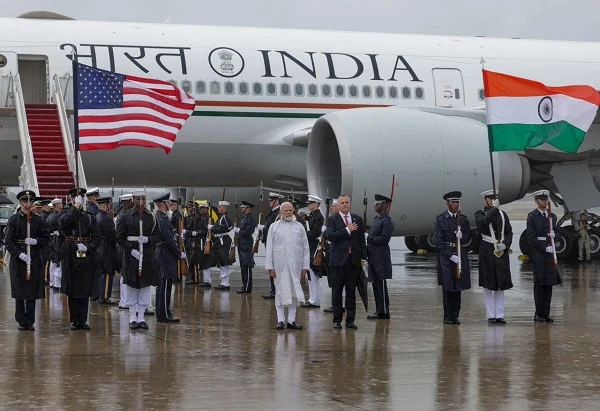

PM Narendra Modi arriving in Washington earlier today (Image courtesy: PMO)
Vitalising defence industrial cooperation and unlocking new innovations in technology and manufacturing, India and the United States launched the India-US Defence Acceleration Ecosystem (INDUS-X) in Washington on Wednesday.
Coming against the backdrop of Prime Minister Narendra Modi’s State Visit to the White House, the initiative expands the strategic technology partnership and defence industrial cooperation between governments, businesses, and academic institutions.
It builds on a commitment by the Indian and US National Security Advisors Ajit Doval and Jake Sullivan in January 2023 to launch an ‘innovation bridge’ to connect the Indian and US defence start-ups as part of the India-US initiative on Critical and Emerging Technology (iCET).
The two governments have affirmed that INDUS-X will catalyze innovation and help equip both countries’ armed forces with the capabilities they need to defend a free and open Indo-Pacific.
The launch event hosted by the US-India Business Council (USIBC) convened representatives from more than 30 Indian and US start-ups, as well as government, business, academic, and thought leaders, for wide-ranging discussions to advance cutting-edge technology cooperation between both nations’ defence industrial ecosystems.
India’s Innovations for Defence Excellence (iDEX) and the Office of the US Secretary of Defence (OSD) are leading INDUS-X activities for both defence ministries at a time when a new surge is witnessed in the India-US defence industrial cooperation to unlock new innovations in technology and manufacturing.
Following the launch event, the US Department of Defence and the Indian Ministry of Defence welcomed the ambitious collaboration agenda that outlines the initiatives INDUS-X stakeholders intend to spearhead.
These initiatives complement existing government-to-government collaboration and include joint prize challenges for start-ups, roundtable events, mentor-protege initiatives between major primes and start-ups, and the formation of a Senior Advisory Group.
The two-day catalyst event, hosted by the USIBC at the US Chamber of Commerce, is seeing defence innovation stakeholders from across both governments, academic and research organizations, investors, defence firms, technology incubators, industry associations, and other start-up enablers coming together to develop ambitious initiatives to drive INDUS-X forward.
With defence and security cooperation having evolved to become a vital pillar of engagement in the wide-ranging strategic partnership, the two nations will work together to identify immediate and high-impact opportunities to cooperatively produce the systems required to meet India’s
military modernization objectives.
The collaboration agenda outlines prospective actions for INDUS-X stakeholders to advance defence innovation between India and the United States, providing timelines and metrics to measure progress in implementing envisioned collaboration initiatives.
A Senior Advisor Group (SAG) will assess the progress of the collaboration agenda and make recommendations to the defence establishments and other INDUS-X stakeholders for future work. The United States Institute of Peace (USIP), Carnegie India, USIBC, the US-India Strategic Partnership Forum (USISPF), and the Society of Indian Defence Manufacturers (SIDM) will convene follow-on programming to drive implementation of the collaboration agenda and identify barriers to implementation for the SAG’s consideration.
Hacking for Allies (H4x), the Information Technology Industry Council (ITIC), and the Indian Institute of Technology (IIT) Hyderabad, in collaboration with additional INDUS-X stakeholders, have expressed their intent to explore opportunities to provide startups with jointly defined problem sets, mentoring, and exposure in defence commercialization, business development, product refinement, technology advancement, funding opportunities, and more.
At the same time, Pennsylvania State University, IIT Madras, and IIT Kanpur have expressed their intent to lead best practice workshops with Indian and American universities and accelerator partners, such as labs, Technology Hub (T-HUB), IITs, and Hacking for India, to exchange best practices in defence innovation, fielding, and commercialization.
IndiaSpora, IndUS Tech Council, Forge/Coimbatore, and T-Hub/Hyderabad will engage private investors to garner support for investment in defence and dual-use startups. India’s Ministry of Defence and the US Defence Department also intend to explore options, including public-private partnership, for a fund to support deep-tech defence start-ups.
In a bid to ease regulations for cross-border development and trade, a Senior Advisor Group will recommend adjustments to respective regulatory schemes – like DFARS, ITAR, EAR, and Make in India – to streamline start-up innovation between the two countries and increase procurement opportunities.
After PM Modi and US President Joe Biden announced the India-US initiative on Critical and Emerging Technology (iCET) in May 2022, the inaugural meeting between NSA Doval and Sullivan in January has proved to be a critical turning point in elevating and expanding the strategic technology partnership and defence industrial cooperation between both countries.
The discussions held in Washington were also attended by the Administrator of the National Aeronautics and Space Administration (NASA), the Chairman of the Indian Space Research Organisation (NASA), the Principal Scientific Advisor to the Indian government, the Director General of the Defence Research and Development Organisation (ISRO), senior officials from the Ministry of Electronics and Information Technology and from the US Department of State, Department of Commerce, the Department of Defence, and the National Security Council.
They had noted the value of establishing ‘innovation bridges’ in key sectors, including through expos, hackathons, and pitch sessions and also identified the fields of biotechnology, advanced materials, and rare earth processing technology as areas for future cooperation.
India decisively asserted its military superiority over Pakistan during this month's brief but intense conflict,…
Trade associations and local business groups in Pakistan-occupied Gilgit-Baltistan (PoGB) launched an indefinite protest on…
A human chain and protest march was organized by various organizations in front of the…
The United States on Saturday announced the expansion of its security partnerships with India through…
Highlighting the use of indigenous platforms during Operation Sindoor, Chief of Defence Staff (CDS) General…
Congress MP Shashi Tharoor on Friday (local time) said that Colombia will issue a statement…